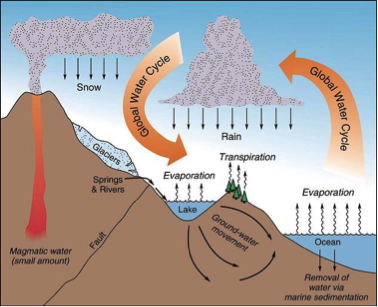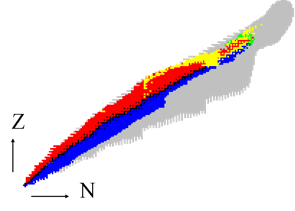Surface Process Geochemistry
Earth and Planetary Science, UC Berkeley -and- Berkeley Geochronology Center
Courses:
EPS 50 The Planet Earth
Instructor: Shuster

This course is a comprehensive and rigorous introduction to the Planet Earth and its geologic processes. Two broad themes will be stressed in the course: The theory of plate tectonics and its ramifications, and the interaction of geologic processes and society. The course is an introduction to the physical and chemical processes that have shaped the earth through time, with emphasis on the dynamics of the earth system. Laboratory and field work will involve studies of minerals, rocks, geological structures and processes.
We cover big questions, such as:
• Why do continents and ocean basins exist?
• How do mountains form?
• Why and where are there earthquakes, volcanoes, floods and hurricanes?
• How can we unravel the chemistry and physics of an evolving dynamic planet?
• How do humans interact with earth systems?
• Are there enough earth resources of fuels and minerals?
• What is the future of our planet?
Fall 2016: TuTh 2 – 3:30pm 150 GSPP
Satisfies Physical Science Requirement
Course control numbers: 14966
EPS 131 General Geochemistry
Instructor: Shuster
 Earth's water cycle
Earth's water cycleThis course covers a broad range of topics involving chemical reactions in geological processes.
We cover:Thermodynamic methods for predicting chemical equilibria in nature; Isotopic and chemical tracers of transport processes in the earth; Box models, advection-dispersion-exchange; Chemistry of the solid earth, oceans, and atmosphere; Aqueous geochemistry, acid-base equilibria, mineral solubility; chemical weathering; Geochemical measurements/observations.
Fall Semesters: TuTh 11:00 – 12:30pm 325 McCone
Satisfies Physical Science Requirement
Course control numbers: 19114 (EPS131)
EPS 124/224 Isotope Geochemistry
Instructor: Shuster
 Chart of the Nuclides: A framework for isotope geochemistry.
Chart of the Nuclides: A framework for isotope geochemistry.
This course introduces students to nuclear processes and current research applying nuclear chemistry to the study of geochemical and geophysical processes.
We cover:
• Aspects of nuclear chemistry
• Types of radioactive decay, nuclear properties, radiation detection, nuclear reactions, nucleosynthesis, and cosmic rays
• Geochronology using cosmogenic and radiogenic nuclides: e.g., 14C, 21Ne, 10Be, 40K-40Ar, 87Rb-87Sr, U-Pb, U series, (U-Th)/4He
• Isotopic tracer studies-using isotopes e.g., Nd, Pb, Sr, Hf, Ca, U, Th, Os, 3He...
• Mathematical models of natural transport processes amenable to study using isotopic methods
• Review of isotope geochemistry methods applied to the study of earth and planetary processes and cosmochemistry
Spring Semesters: Tu/Th 11:00 – 12:30pm 325 McCone
Satisfies Physical Science Requirement
Course control numbers: 19079 (EPS124); 19209 (EPS224)